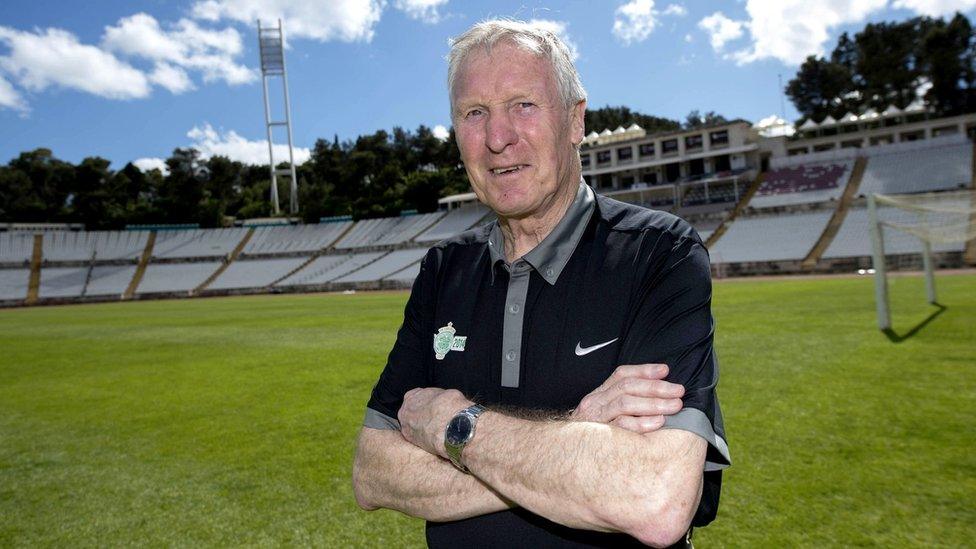Dementia in football: Frank Kopel's wife calls for introduction of 'Frank's Law'
- Published
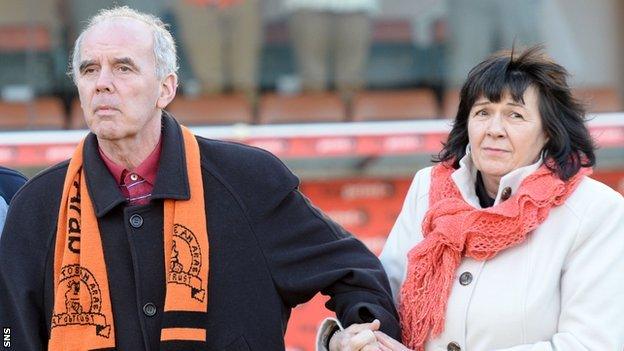
Frank Kopel and his wife Amanda during a visit to Tannadice in 2014
Triumph and tragedy are the extremes of professional sport.
Frank Kopel, the former Dundee United and Manchester United defender, experienced both.
Jim McLean's first signing at Tannadice, he won two League Cups having previously been at Manchester United under Sir Matt Busby.
His wonder strike against Anderlecht is widely regarded as one of Dundee United's finest ever goals.
Frank's biggest battle, though, a heart-breaking and tragic one, resulted in his passing in 2014 after a fight against debilitating dementia.
His family still strive to ensure their struggle was not in vain.
Frank's wife Amanda has been campaigning for the introduction of "Frank's Law", essentially free personal care for those in need under the age of 65. Frank was under 65 and thus not entitled to state support.
She is firm in her belief that his dementia was the direct result of heading footballs.
First signs - 'He was just sitting staring'
In an interview broadcast on BBC Radio Scotland's Sportsound on Tuesday, Amanda outlined what the family endured.
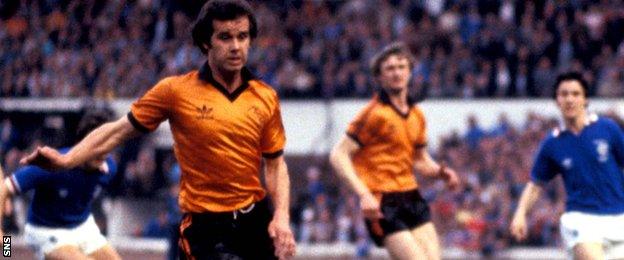
Frank Kopel during his playing days for Dundee United
"Frank was working as a rep," she said. "He'd been in Aberdeen that day and had to put his mileage in. He was just sitting staring.
"I said 'You've only put 30 miles here, it's longer than 30 miles to Aberdeen and back.' That was the first signs."
It wasn't long until they received the "devastating news". It was a complete shock.
His diagnosis was vascular dementia. Amanda consulted a friend, a US-based neurologist who believed that diagnosis to be wrong. His view was that Frank's dementia was Chronic Traumatic Encephalopathy, caused by knocks to the head.
'Worth looking at reducing exposure to heading'
Increasingly, there is concern across sport about the impact of athletes receiving knocks to the head.
"CTE is a degenerative brain disease which until recently we thought was unique to boxers," Neuropathologist Willie Stewart told BBC Scotland.
"What we've realised in the last decade is that there's other sports where brain injury and brain impact can be associated with it and we can begin to see CTE.
"We're beginning to see more cases in rugby; we're beginning to see more cases in football as well.
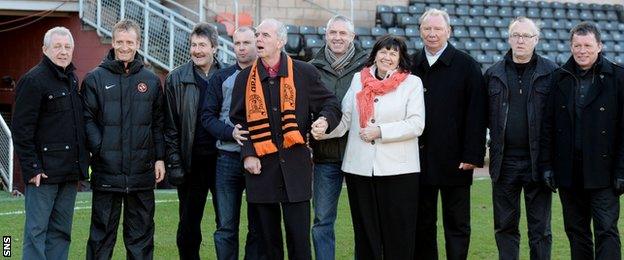
Dundee United legends joined the Kopels on the Tannadice pitch to raise awareness about the Frank's Law campaign
"Whether it's heading in football or head injuries in football, we can't say for certain. Something we need to be looking at is what is it in football which may be predisposing to this pathology?
"As regards heading, at this stage we don't have evidence to say the act of heading itself produces any damage to the brain. We may suggest that it might be worth looking at reducing exposure to heading.
"There is no doubt at all there are increasing numbers of stories that raise concern. There's no question whatsoever that the sport of football really has to address this, really has to look at dementia as a problem for former footballers, and if so, what is the problem?
"We're only just beginning to get to grips and recognise that this is something we should be exploring. It's a problem across all sport."
Amanda Kopel and others affected by this within football believe the evidence is compelling.
"The SFA should be standing up and being counted," she said.
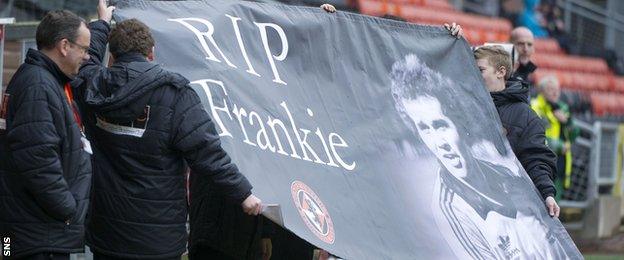
Dundee United paid tribute to Frank Kopel following his passing in 2014
"No-one approached us during Frankie's illness whatsoever. It's about time the SFA, if they hear of one of their players and their families struggling, they should be able to say 'how can we help?' because we didn't get any help from them."
'How many more Franks are out there?'
The Frank's Law campaign appears to be influencing Holyrood, with a feasibility study into provision of free personal care for under-65s.
Amanda believes they were fortunate despite the struggle they faced. They had valuable memorabilia they could sell, none more poignant than a 'Busby Babe' blazer from Frank's time at Manchester United, where he was part of the squad for the 1968 European Cup final.
One day a parcel arrived with a heart-warming letter from the fan who bought it and wanted to return it after hearing of Frank's health.
"I took it through to the bedroom, hung it on the back of the door and lay back down beside Frankie and said to him 'Your blazer's come home son and when you waken up and open your eyes you'll see it'," Amanda said.
"He died the following morning at ten past six.
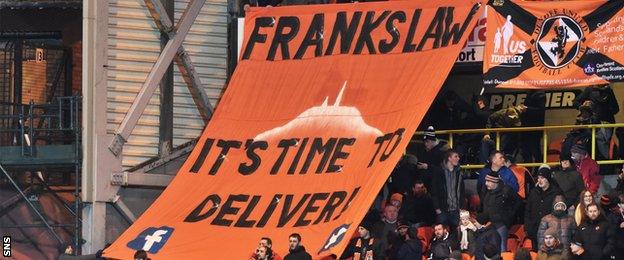
The Dundee United fans have backed calls for the introduction of 'Frank's Law'
"How many more Franks are out there?
"(Frank) battled with great strength, courage and dignity. Because he was under 65, as he deteriorated he needed help with personal care. We had to pay for that but had he reached 65 it's free.
"There are people in their 30s, 40s and 50s who are being diagnosed and still to this day being discriminated against and having to pay for personal care. It's wrong.
"We were sitting one day and Frankie took my hand and said 'Tell them Amanda, it's too late for me but it'll help others in the future'.
"I promised him then I would tell them and I have been telling them. Thank God now, finally, people in Holyrood who can make that change are listening.
"It's about time Frank's Law was delivered."
- Published7 March 2017
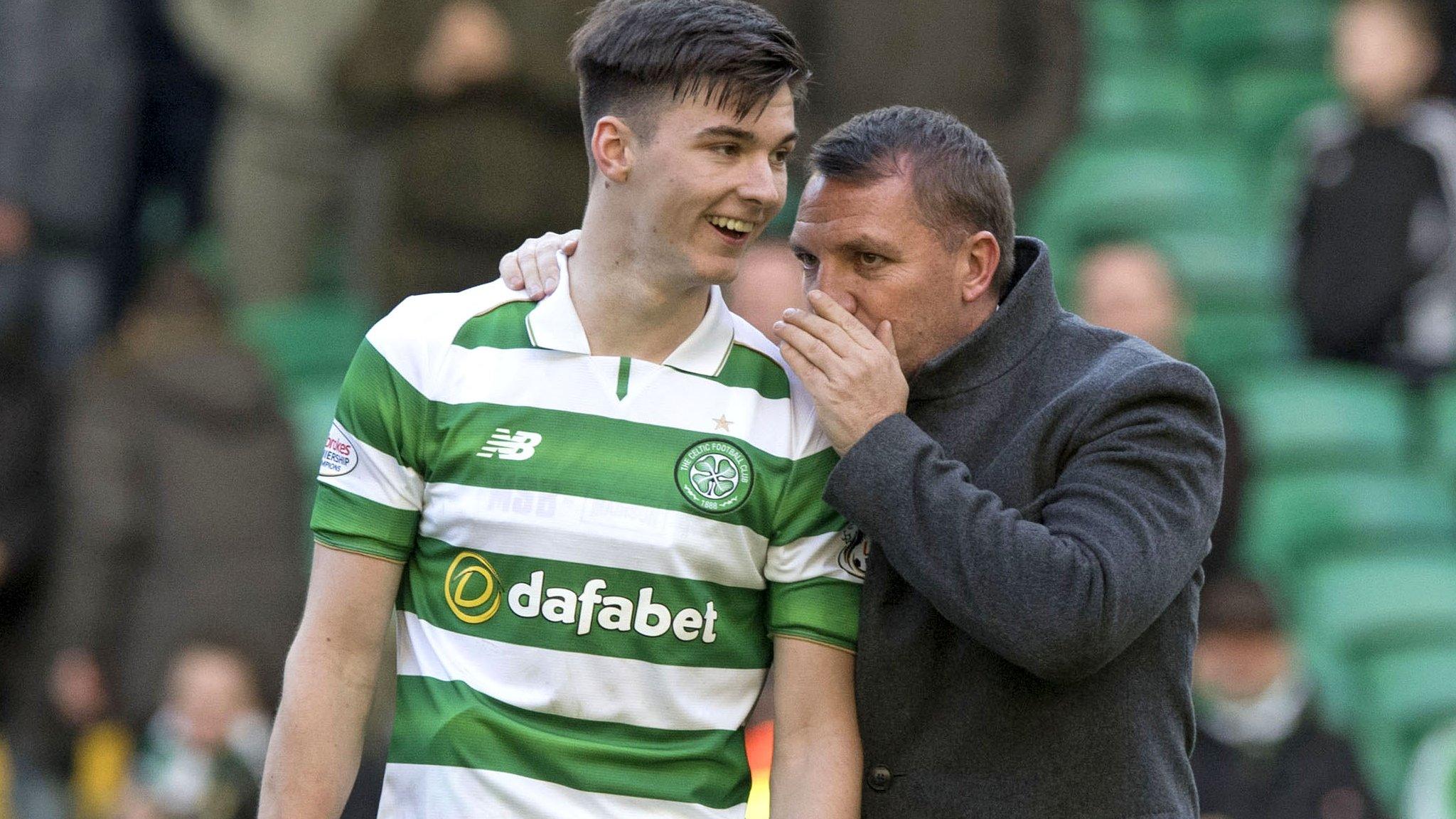
- Attribution
- Published27 February 2017

- Attribution
- Published26 February 2017
